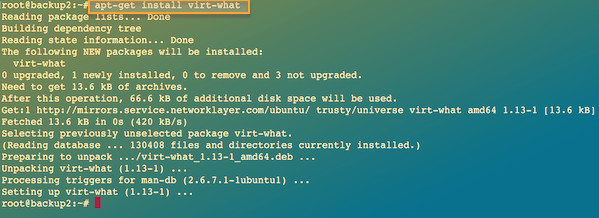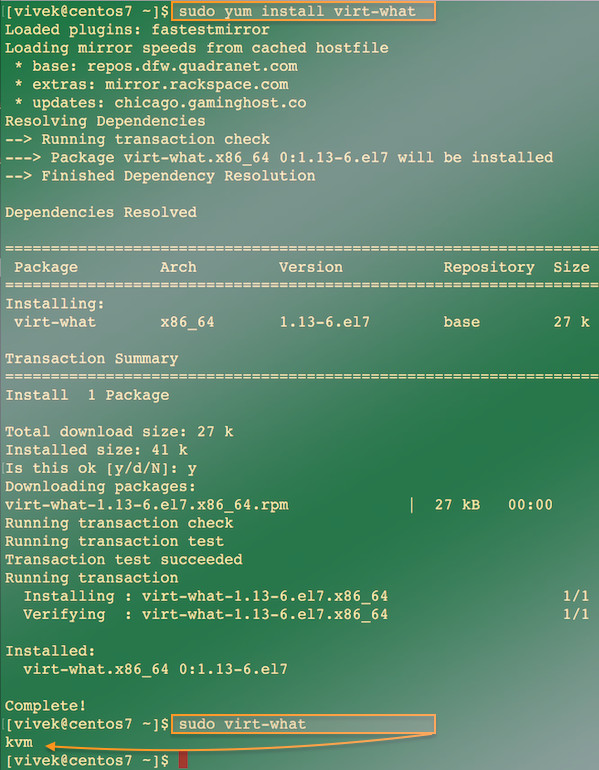http://www.cyberciti.biz/faq/linux-determine-virtualization-technology-command
I have a cloud-based virtual machine running Ubuntu and CentOS Linux server. It may or may not be virtualized. How do I determine what kind of virtualization technology (VMWARE/ KVM/ XEN/ VirtualBox/ Container/ lxc/Hyper-V etc.) a Linux guest system running on? How do I find out the virtualization type of a CentOS 7 Linux VPS?
You need to use the virt-what program (shell script) to detect the type of virtualization being used (or none at all if we’re running on bare-metal). It prints out one of more lines each being a ‘fact’ about the virtualization.
OR
Another output:
Another output:
I have a cloud-based virtual machine running Ubuntu and CentOS Linux server. It may or may not be virtualized. How do I determine what kind of virtualization technology (VMWARE/ KVM/ XEN/ VirtualBox/ Container/ lxc/Hyper-V etc.) a Linux guest system running on? How do I find out the virtualization type of a CentOS 7 Linux VPS?
You need to use the virt-what program (shell script) to detect the type of virtualization being used (or none at all if we’re running on bare-metal). It prints out one of more lines each being a ‘fact’ about the virtualization.
Install virt-what on Debian or Ubuntu Linux VM
$ sudo apt-get install virt-whatOR
$ sudo apt install virt-whatInstall virt-what on RHEL/CentOS/Scientific Linux VM
$ sudo yum install virt-whatInstall virt-what on Fedora Linux VM
$ sudo dnf install virt-whatCheck if your remote server runs in virtual environment
Simply type the following command:$ sudo virt-what
xen
xen-domUAnother output:
$ sudo virt-what
kvmAnother output:
$ sudo virt-what
lxcOther possible values
- hyperv : This is Microsoft Hyper-V hypervisor.
- parallels : The guest is running inside Parallels Virtual Platform (Parallels Desktop, Parallels Server).
- powervm_lx86 : The guest is running inside IBM PowerVM Lx86 Linux/x86 emulator.
- qemu : This is QEMU hypervisor using software emulation.
- virtualpc : The guest appears to be running on Microsoft VirtualPC.
- xen-hvm : This is a Xen guest fully virtualized (HVM).
- uml : This is a User-Mode Linux (UML) guest.
- openvz : The guest appears to be running inside an OpenVZ or Virtuozzo container.
- linux_vserver : This process is running in a Linux VServer container.
- ibm_systemz : This is an IBM SystemZ (or other S/390) hardware partitioning system.
#!/bin/bash - # virt-what. Generated from virt-what.in by configure. # Copyright (C) 2008-2011 Red Hat Inc. # Do not allow unset variables, and set defaults. set -u root='' skip_qemu_kvm=false VERSION="1.13" function fail { echo "virt-what: $1" >&2 exit 1 } function usage { echo "virt-what [options]" echo "Options:" echo " --help Display this help" echo " --version Display version and exit" exit 0 } # Handle the command line arguments, if any. TEMP=$(getopt -o v --long help --long version --long test-root: -n 'virt-what' -- "$@") if [ $? != 0 ]; then exit 1; fi eval set -- "$TEMP" while true; do case "$1" in --help) usage ;; --test-root) # Deliberately undocumented: used for 'make check'. root="$2" shift 2 ;; -v|--version) echo "$VERSION"; exit 0 ;; --) shift; break ;; *) fail "internal error ($1)" ;; esac done # Add /sbin and /usr/sbin to the path so we can find system # binaries like dmicode. # Add /usr/libexec to the path so we can find the helper binary. prefix=/usr exec_prefix=${prefix} PATH="${root}${prefix}/lib/virt-what:${root}/sbin:${root}/usr/sbin:${PATH}" # Check we're running as root. if [ "x$root" = "x" ] && [ "$EUID" -ne 0 ]; then fail "this script must be run as root" fi # Many fullvirt hypervisors give an indication through CPUID. Use the # helper program to get this information. cpuid=$(virt-what-cpuid-helper) # Check for various products in the BIOS information. # Note that dmidecode doesn't exist on non-PC architectures. On these, # this will return an error which is ignored (error message redirected # into $dmi variable). dmi=$(LANG=C dmidecode 2>&1) # Architecture. # Note for the purpose of testing, we only call uname with -p option. arch=$(uname -p) # Check for VMware. # cpuid check added by Chetan Loke. if [ "$cpuid" = "VMwareVMware" ]; then echo vmware elif echo "$dmi" | grep -q 'Manufacturer: VMware'; then echo vmware fi # Check for Hyper-V. # http://blogs.msdn.com/b/sqlosteam/archive/2010/10/30/is-this-real-the-metaphysics-of-hardware-virtualization.aspx if [ "$cpuid" = "Microsoft Hv" ]; then echo hyperv fi # Check for VirtualPC. # The negative check for cpuid is to distinguish this from Hyper-V # which also has the same manufacturer string in the SM-BIOS data. if [ "$cpuid" != "Microsoft Hv" ] && echo "$dmi" | grep -q 'Manufacturer: Microsoft Corporation'; then echo virtualpc fi # Check for VirtualBox. # Added by Laurent Léonard. if echo "$dmi" | grep -q 'Manufacturer: innotek GmbH'; then echo virtualbox fi # Check for OpenVZ / Virtuozzo. # Added by Evgeniy Sokolov. # /proc/vz - always exists if OpenVZ kernel is running (inside and outside # container) # /proc/bc - exists on node, but not inside container. if [ -d "${root}/proc/vz" -a ! -d "${root}/proc/bc" ]; then echo openvz fi # Check for LXC containers # http://www.freedesktop.org/wiki/Software/systemd/ContainerInterface # Added by Marc Fournier if [ -e "${root}/proc/1/environ" ] && cat "${root}/proc/1/environ" | tr '\000' '\n' | grep -Eiq '^container='; then echo lxc fi # Check for Linux-VServer if cat "${root}/proc/self/status" | grep -q "VxID: [0-9]*"; then echo linux_vserver fi # Check for UML. # Added by Laurent Léonard. if grep -q 'UML' "${root}/proc/cpuinfo"; then echo uml fi # Check for IBM PowerVM Lx86 Linux/x86 emulator. if grep -q '^vendor_id.*PowerVM Lx86' "${root}/proc/cpuinfo"; then echo powervm_lx86 fi # Check for Hitachi Virtualization Manager (HVM) Virtage logical partitioning. if echo "$dmi" | grep -q 'Manufacturer.*HITACHI' && echo "$dmi" | grep -q 'Product.* LPAR'; then echo virtage fi # Check for IBM SystemZ. if grep -q '^vendor_id.*IBM/S390' "${root}/proc/cpuinfo"; then echo ibm_systemz if [ -f "${root}/proc/sysinfo" ]; then if grep -q 'VM.*Control Program.*z/VM' "${root}/proc/sysinfo"; then echo ibm_systemz-zvm elif grep -q '^LPAR' "${root}/proc/sysinfo"; then echo ibm_systemz-lpar else # This is unlikely to be correct. echo ibm_systemz-direct fi fi fi # Check for Parallels. if echo "$dmi" | grep -q 'Vendor: Parallels'; then echo parallels skip_qemu_kvm=true fi # Check for Xen. if [ "$cpuid" = "XenVMMXenVMM" ]; then echo xen; echo xen-hvm skip_qemu_kvm=true elif [ -f "${root}/proc/xen/capabilities" ]; then echo xen if grep -q "control_d" "${root}/proc/xen/capabilities"; then echo xen-dom0 else echo xen-domU fi skip_qemu_kvm=true elif [ -f "${root}/sys/hypervisor/type" ] && grep -q "xen" "${root}/sys/hypervisor/type"; then # Ordinary kernel with pv_ops. There does not seem to be # enough information at present to tell whether this is dom0 # or domU. XXX echo xen elif [ "$arch" = "ia64" ]; then if [ -d "${root}/sys/bus/xen" -a ! -d "${root}/sys/bus/xen-backend" ]; then # PV-on-HVM drivers installed in a Xen guest. echo xen echo xen-hvm else # There is no virt leaf on IA64 HVM. This is a last-ditch # attempt to detect something is virtualized by using a # timing attack. virt-what-ia64-xen-rdtsc-test > /dev/null 2>&1 case "$?" in 0) ;; # not virtual 1) # Could be some sort of virt, or could just be a bit slow. echo virt esac fi fi # Check for QEMU/KVM. # # Parallels exports KVMKVMKVM leaf, so skip this test if we've already # seen that it's Parallels. Xen uses QEMU as the device model, so # skip this test if we know it is Xen. if ! "$skip_qemu_kvm"; then if [ "$cpuid" = "KVMKVMKVM" ]; then echo kvm else # XXX This is known to fail for qemu with the explicit -cpu # option, since /proc/cpuinfo will not contain the QEMU # string. The long term fix for this would be to export # another CPUID leaf for non-accelerated qemu. if grep -q 'QEMU' "${root}/proc/cpuinfo"; then echo qemu fi fi fi |



No comments:
Post a Comment